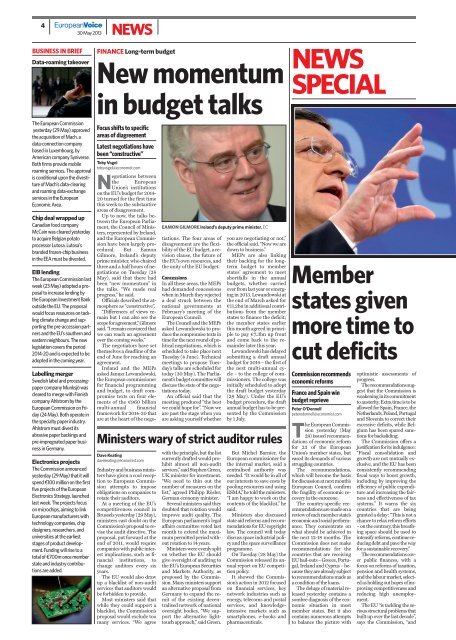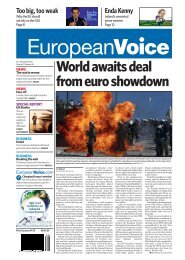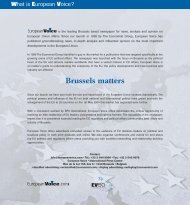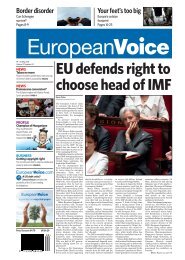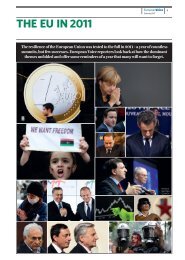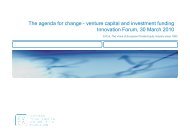special report - European Voice
special report - European Voice
special report - European Voice
Create successful ePaper yourself
Turn your PDF publications into a flip-book with our unique Google optimized e-Paper software.
4<br />
30 May 2013 NEWS<br />
BUSINESS IN BRIEF<br />
Data-roaming takeover<br />
The <strong>European</strong> Commission<br />
yesterday (29 May) approved<br />
the acquisition of Mach, a<br />
data-connection company<br />
based in Luxembourg, by<br />
American company Syniverse.<br />
Both firms provide mobile<br />
roaming services. The approval<br />
is conditional upon the divestiture<br />
of Mach’s data-clearing<br />
and roaming data-exchange<br />
services in the <strong>European</strong><br />
Economic Area.<br />
Chip deal wrapped up<br />
Canadian food company<br />
McCain was cleared yesterday<br />
to acquire Belgian potato<br />
processor Lutosa. Lutosa’s<br />
branded frozen-chip business<br />
in the EEA must be divested.<br />
EIB lending<br />
The <strong>European</strong> Commission last<br />
week (23 May) adopted a proposal<br />
to increase lending by<br />
the <strong>European</strong> Investment Bank<br />
outside the EU. The proposal<br />
would focus resources on tackling<br />
climate change and supporting<br />
the pre-accession partners<br />
and the EU’s southern and<br />
eastern neighbours. The new<br />
legislation covers the period<br />
2014-20 and is expected to be<br />
adopted in the coming year.<br />
Labelling merger<br />
Swedish label and processingpaper<br />
company Munksjö was<br />
cleared to merge with Finnish<br />
company Ahlstrom by the<br />
<strong>European</strong> Commission on Friday<br />
(24 May). Both operate in<br />
the <strong>special</strong>ty paper industry.<br />
Ahlstrom must divest its<br />
abrasive paper backings and<br />
pre-impregnated paper business<br />
in Germany.<br />
Electronics projects<br />
The Commission announced<br />
yesterday (29 May) that it will<br />
spend €100 million on the first<br />
five projects of the <strong>European</strong><br />
Electronics Strategy, launched<br />
last week. The projects focus<br />
on microchips, aiming to link<br />
<strong>European</strong> manufacturers with<br />
technology companies, chip<br />
designers, researchers, and<br />
universities at the earliest<br />
stages of product development.<br />
Funding will rise to a<br />
total of €700m once member<br />
state and industry contributions<br />
are added.<br />
FINANCE Long-term budget<br />
New momentum<br />
in budget talks<br />
Focus shifts to specific<br />
areas of diagreement<br />
Latest negotiations have<br />
been “constructive”<br />
Toby Vogel<br />
tobyvogel@economist.com<br />
Dave Keating<br />
davekeating@economist.com<br />
Industry and business ministers<br />
have given a cool reception<br />
to <strong>European</strong> Commission<br />
attempts to impose<br />
obligations on companies to<br />
rotate their auditors.<br />
At a meeting of the EU’s<br />
competitiveness council in<br />
Brussels yesterday (29 May),<br />
ministers cast doubt on the<br />
Commission’s proposal to revise<br />
the audit directive. The<br />
proposal, put forward at the<br />
end of 2011, would require<br />
companies with public interest<br />
implications, such as financial<br />
institutions, to<br />
change auditors every six<br />
years.<br />
The EU would also draw<br />
up a blacklist of non-audit<br />
services that auditors would<br />
be forbidden to provide.<br />
Most ministers said that<br />
while they could support a<br />
blacklist, the Commission’s<br />
proposal would exclude too<br />
many services. “We agree<br />
EAMON GILMORE Ireland’s deputy prime minister. EC<br />
Negotiations between<br />
the <strong>European</strong><br />
Union’s institutions<br />
on the EU’s budget for 2014-<br />
20 turned for the first time<br />
this week to the substantive<br />
areas of disagreement.<br />
Up to now, the talks between<br />
the <strong>European</strong> Parliament,<br />
the Council of Ministers,<br />
represented by Ireland,<br />
and the <strong>European</strong> Commission<br />
have been largely procedural.<br />
But Eamon<br />
Gilmore, Ireland’s deputy<br />
prime minister, who chaired<br />
three and a half hours of negotiations<br />
on Tuesday (28<br />
May), said that there had<br />
been “new momentum” in<br />
the talks. “We made real<br />
progress,” he said.<br />
Officials described the atmosphere<br />
as “constructive”.<br />
“Differences of views remain<br />
but I can also see the<br />
scope for agreement,” Gilmore<br />
said. “I remain convinced that<br />
we can reach an agreement<br />
over the coming weeks.”<br />
The negotiators have set<br />
themselves a deadline of the<br />
end of June for reaching an<br />
agreement.<br />
Ireland and the MEPs<br />
asked Janusz Lewandowski,<br />
the <strong>European</strong> commissioner<br />
for financial programming<br />
and budget, to draft compromise<br />
texts on four elements<br />
of the €960 billion<br />
multi-annual financial<br />
framework for 2014-20 that<br />
are at the heart of the negotiations.<br />
The four areas of<br />
disagreement are the flexibility<br />
of the EU budget, a revision<br />
clause, the future of<br />
the EU’s own resources, and<br />
the unity of the EU budget.<br />
Concessions<br />
In all these areas, the MEPs<br />
had demanded concessions<br />
when in March they rejected<br />
a deal struck between the<br />
national governments at<br />
February’s meeting of the<br />
<strong>European</strong> Council.<br />
The Council and the MEPs<br />
asked Lewandowski to produce<br />
the compromise texts in<br />
time for the next round of political<br />
negotiations, which is<br />
scheduled to take place next<br />
Tuesday (4 June). Technical<br />
meetings to propose Tuesday’s<br />
talks are scheduled for<br />
today (30 May). The Parliament’s<br />
budget committee will<br />
discuss the state of the negotiations<br />
today.<br />
An official said that the<br />
meeting produced “the best<br />
we could hope for”. “Now we<br />
are past the stage when you<br />
are asking yourself whether<br />
with the principle, but the list<br />
currently drafted would prohibit<br />
almost all non-audit<br />
services,” said Stephen Green,<br />
UK minister for investment.<br />
“We need to thin out the<br />
number of measures on the<br />
list,” agreed Philipp Rösler,<br />
German economy minister.<br />
Several ministers said they<br />
doubted that rotation would<br />
improve audit quality. The<br />
<strong>European</strong> parliament’s legal<br />
affairs committee voted last<br />
month to extend the maximum<br />
permitted period without<br />
rotation to 14 years.<br />
Ministers were evenly split<br />
on whether the EU should<br />
give oversight of auditing to<br />
the EU’s <strong>European</strong> Securities<br />
and Markets Authority, as<br />
proposed by the Commission.<br />
Many ministers support<br />
an alternative proposal from<br />
Germany to expand the remit<br />
of the existing decentralised<br />
network of national<br />
oversight bodies. “We support<br />
the alternative lighttouch<br />
approach,” said Green.<br />
you are negotiating or not,”<br />
the official said. “Now we are<br />
down to business.”<br />
MEPs are also linking<br />
their backing for the longterm<br />
budget to member<br />
states’ agreement to meet<br />
shortfalls in the annual<br />
budgets, whether carried<br />
over from last year or emerging<br />
in 2013. Lewandowski at<br />
the end of March asked for<br />
€11.2bn in additional contributions<br />
from the member<br />
states to finance the deficit;<br />
the member states earlier<br />
this month agreed in principle<br />
to pay €7.3bn up front<br />
and come back to the remainder<br />
later this year.<br />
Lewandowski has delayed<br />
submitting a draft annual<br />
budget for 2014 – the first of<br />
the next multi-annual cycle<br />
– to the college of commissioners.<br />
The college was<br />
initially scheduled to adopt<br />
the draft budget yesterday<br />
(29 May). Under the EU’s<br />
budget procedure, the draft<br />
annual budget has to be presented<br />
by the Commission<br />
by 1 July.<br />
Ministers wary of strict auditor rules<br />
But Michel Barnier, the<br />
<strong>European</strong> commissioner for<br />
the internal market, said a<br />
centralised authority was<br />
needed. “It would be in all of<br />
our interests to save costs by<br />
pooling resources and using<br />
ESMA,” he told the ministers.<br />
“I am happy to work on the<br />
contents of the blacklist,” he<br />
said.<br />
Ministers also discussed<br />
state aid reforms and recommendations<br />
for EU copyright<br />
law. The council will today<br />
discuss space industrial policy<br />
and the space surveillance<br />
programme.<br />
On Tuesday (28 May) the<br />
Commission released its annual<br />
<strong>report</strong> on EU competition<br />
policy.<br />
It showed the Commission’s<br />
action in 2012 focused<br />
on financial services, key<br />
network industries such as<br />
energy, telecoms and postal<br />
services, and knowledgeintensive<br />
markets such as<br />
smartphones, e-books and<br />
pharmaceuticals.<br />
NEWS<br />
SPECIAL<br />
Member<br />
states given<br />
more time to<br />
cut deficits<br />
Commission recommends<br />
economic reforms<br />
France and Spain win<br />
budget reprieve<br />
Peter O’Donnell<br />
peterodonnell@economist.com<br />
The <strong>European</strong> Commission<br />
yesterday (May<br />
29) issued recommendations<br />
of economic reform<br />
for 23 of the <strong>European</strong><br />
Union’s member states, but<br />
eased its demands of various<br />
struggling countries.<br />
The recommendations,<br />
which will become the basis<br />
for discussion at next month’s<br />
<strong>European</strong> Council, confirm<br />
the fragility of economic recovery<br />
in the eurozone.<br />
The country-specific recommendations<br />
are made on a<br />
review of each member state’s<br />
economic and social performance.<br />
They concentrate on<br />
what should be achieved in<br />
the next 12-18 months. The<br />
Commission does not make<br />
recommendations for the<br />
countries that are receiving<br />
EU bail-outs – Greece, Portugal,<br />
Ireland and Cyprus – because<br />
they are already subject<br />
to recommendations made as<br />
a condition of the loans.<br />
The deluge of material released<br />
yesterday contains a<br />
sombre diagnosis of the economic<br />
situation in most<br />
member states. But it also<br />
contains numerous attempts<br />
to balance the picture with<br />
optimistic assessments of<br />
progress.<br />
The recommendations suggest<br />
that the Commission is<br />
weakening in its commitment<br />
to austerity. Extra time is to be<br />
allowed for Spain, France, the<br />
Netherlands, Poland, Portugal<br />
and Slovenia to correct their<br />
excessive deficits, while Belgium<br />
has been spared sanctions<br />
for backsliding.<br />
The Commission offers a<br />
justification for its indulgence:<br />
“Fiscal consolidation and<br />
growth are not mutually exclusive,<br />
and the EU has been<br />
consistently recommending<br />
fiscal ways to boost growth,<br />
including by improving the<br />
efficiency of public expenditure<br />
and increasing the fairness<br />
and effectiveness of tax<br />
systems.” It warns the six<br />
countries that are being<br />
granted a delay: “This is not a<br />
chance to relax reform efforts<br />
– on the contrary, this breathing<br />
space should be used to<br />
intensify reforms, continue reducing<br />
debt and pave the way<br />
for a sustainable recovery.”<br />
The recommendations cover<br />
public finances, with a<br />
focus on reforms of taxation,<br />
pension and health systems,<br />
and the labour market, selected<br />
as holding out hopes of improving<br />
competitiveness and<br />
reducing high unemployment.<br />
The EU “is tackling the serious<br />
structural problems that<br />
built up over the last decade”,<br />
says the Commission, “and


